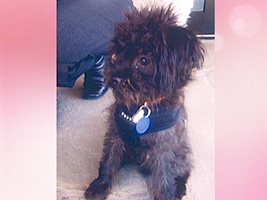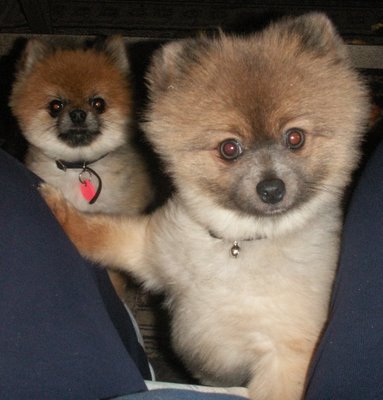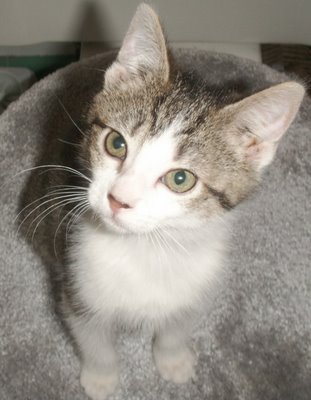
His name is Iggy.
He's a little dog
Ellen and Portia adopted from a nonprofit rescue operation.

The
Iggs didn't get along with their cats, however, so - unfortunately - instead of figuring out how to get the kitties to be socialized with him, she gave it away to her hair dresser/makeup artist, who has two girls, 11 and 12.
Ellen signed a contract when she adopted the dog that if the mutt didn't work out, she'd take it back to the adoption center. That's an ordinary policy for good breeders and rescue operations because some people who pass the interview and assessment form as "good homes" for adopted pets actually give them away to places that experiment on dogs or abuse them.
The contract is designed to protect both the new adopter and the pup. So the adopter knows she or he can take it back and the rescue operation knows the dog is safe and well cared for.
Further, the rescuers' policy is not to let homes with kids younger than 14 adopt little dogs for safety and protection reasons. Lots of rescue operations, animal shelters and humane societies have similar rules.
So where the problem came up: when the rescue operation discovered Ellen had given the dog away to someone the rescuers did not know or understand to be a qualified, safe home.
Then the problem was exacerbated because M&M, instead of inspecting the home and asking the family to fill out an application, just took the dog away. Ellen broke the contract and the kids are under 14.
On Ellen's side, she didn't take the dog back to M&M with the family, explaining what happened, having them fill out an application so they could make sure the dog got a great, loving and safe home.
Worse, both sides threatened the other. M&M said they'd go to the media if Ellen didn't return the pet, Ellen's publicist threatened to take legal action against M&M - which would never work because Ellen had broken the contract.
Now the rescuers are getting death threats - blamed for breaking the hearts of the two kids - which is ridiculous.
Unfortunately, this is the second time I am aware of that Ellen has adopted a dog and had to give it away. Previously, the dog named Lucy, was given away without an incident, so there's little wonder that she thought she could do it again.
I don't understand anyone adopting an animal believing they can simply take back or pass on to someone else. It's really tough on animals - especially cats. Homework and research (how to find the right pet for you, how it suits your family and lifestyle) should help you determine exactly what sort of pet you can bring home to keep.
Any pet adopted ought to be brought home with the idea of keeping it until it dies - or you do - unless an extremely difficult problem arises that was
unforeseen, which is typical in puppy mill puppies.
Both sides screwed up, but they could have solved the problem if they hadn't allowed it to escalate.
I worked as a volunteer for the Seattle Animal Shelter for two years, and ran a
petcalmer.com website for four years, which helped people with all their pet problems and sold a CD and cassette that calmed pets (it was me talking to their animals - it was shockingly effective).
Here's how to test if a new pet fits in with your current crew:
Rub a washcloth on your current pet(s). Rub it lots, so it deeply picks up every one's scent.
Rub a washcloth on the potential pet(s). Rub it lots, so it deeply picks up every one's scent. Use one washcloth for every pet you have at home.
Put the scented cloth of your pet(s) in the bed of the new pet and let the new pet sleep on it for one or two nights.
Likewise, set the scented cloth of the new pet in the bed(s) of your current pet(s), and let your pet(s) sleep with the scent of the new pet for a night or two.
Actually, if your current pets go crazy - disliking the potential pet's scent horribly - that's a pretty good indication these guys are not going to be too compatible. At that point you can pull the plug on the adoption or if you know how to socialize animals, you know your work is cut out for you.
All this takes place before the adoption is finalized.
Here's how to socialize a new adopted pet to fit in with your current pets, no matter if they're dogs or cats:
Keep the new pet isolated in a small area with food, water and toys; cats also need a kitty litter box.
The area should be dark as much as possible because dogs and cats see much better in the dark than bright lights, and they feel safer in smaller areas. That's why the only reason dogs and cats don't like to be in crates (for short periods of time) is that their human convinces them that it's a punishment or bad thing.
My four pets go into their crates with the door open all the time because they love the safety, quiet and darkness that's a throwback to thousands of years ago when we all lived in caves - they were the safest place to be.

The animals will telepathically and vocally communicate with one another.
I visit the new pet every few hours, letting him/her know that I am the source of everything they get - food, water, walking or a clean kitty litter, love, freedom.

After a couple days (or more if the pet needs additional care/socialization) of this? You should have a socialized, affectionate pet.

My Allie Cat was a little wild girl, but after three days of this, she's the best kitty ever, and my three pups adore her. Two of them play with her every day and often - wrestling, playing tag and sharing toys. Mistletoe's a little old to play with the youngsters.
Note to everyone who loves animals: please love them enough to learn how to properly take care of them.
Labels: Allie Cat, dog squabble, Ellen, Iggy, JR, Mistletoe, Mutts and Moms, puppy rift, Seeker










